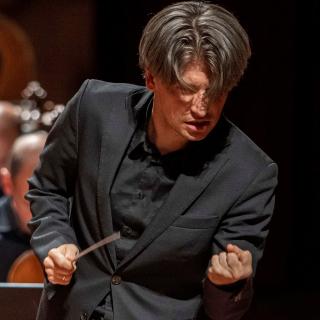The Eroica is justifiably recognised as a landmark in the history of music.
Beethoven's contemporaries were astounded by the symphony (which Beethoven always regarded as his best), and no wonder, for the scope, dramatic structure and techniques were unlike anything they had ever heard. The Eroica is justifiably recognised as a landmark in the history of music. A programme of Beethoven that brings dazzling sound, light and timeless beauty to the dark season.
Ludwig van Beethoven: Piano Concerto No. 4 in G Major, Op. 58
Ludwig van Beethoven (1770–1827) dreamt of becoming a pianist-composer until deafness put an end to that. On the programme for his last public appearance were the premieres of the 5th, 6th and Choral Symphony, plus 2 movements from his Mass in C and the 4th Piano Concerto. He also improvised at the keyboard. The concerto got a good reception, despite the fact that the audience had to sit through a marathon concert virtually sight-read by poorly-rehearsed singers and players in a freezing cold hall. Those expecting something more dramatic were nevertheless disappointed and the concerto was soon forgotten.
The opening is an immediate break with tradition in that it begins with a piano solo. During the enigmatic second movement only 72 bars long, piano and orchestra engage in an intensive dialogue sometimes said to have been inspired by the myth of Orpheus and the furies, but there is nothing to substantiate this claim. The third movement is a sprightly, dancing Rondo.
Ludwig van Beethoven: Symphony No. 3 in E Flat, Op. 55, “Eroica”
An ardent anti-monarchist, Ludwig van Beethoven (1770–1827) admired the young Napoleon and on its completion dedicated his third symphony to his hero. But when Bonaparte declared himself Emperor of France only a couple of months later, Beethoven was so disgusted that he crossed out the original title and dedication, replacing them with the words “Sinfonia eroica, composed to celebrate the memory of a great man”. His contemporaries were astounded by the symphony (which Beethoven always regarded as his best), and no wonder, for the scope, dramatic structure and techniques were unlike anything they had ever heard. The Eroica is justifiably recognised as a landmark in the history of music.
The first movement is a radical re-interpretation of sonata form and its potential, ingeniously and logically developing little motifs. The second is a funeral march, the third a Scherzo, and the finale a set of variations on a theme Beethoven had already used in his ballet The Creatures of Prometheus and his E-flat major variations for piano, Op. 35.
Francesco Piemontesi
Francesco Piemontesi (born 1983 in Locarno) is a Swiss-Italian pianist. His wide repertoire includes works from the Baroque era to contemporary music, and he performs around the globe.
Piemontesi is a renowned interpreter of the solo works and piano concertos of Ludwig van Beethoven. In the 2024 autumn season, Piemontesi will perform Beethoven’s Piano Concerto No. 4 in six international concerts before his guest appearance as the piano soloist with the Helsinki Philharmonic Orchestra. He is scheduled to feature the concerto at the BBC Proms in London, in the United States, and in Hungary. Additionally, Piemontesi will perform other works of the composer in recitals and concerts across Europe. From 2025, he will present Beethoven’s piano sonatas at London’s Wigmore Hall.
Piemontesi studied at the Hochschule für Musik und Theater Hannover. He has been Artistic Director of the music festival Settimane Musicali di Ascona in Switzerland since 2012.
Daniele Rustioni
Daniele Rustioni (b. 1983) is one of the most compelling conductors of his generation and is a major presence at leading opera houses and symphony orchestras. In 2022, the International Opera Awards named him ”Best Conductor.” In November 2024 he has been appointed Principal Guest Conductor of the Metropolitan Opera, starting with the season 2025/26.
Now in his eighth season as Music Director of Opéra National de Lyon, Rustioni concludes his tenure in summer 2025. He was Principal Guest Conductor of the Bavarian State Opera till October 2023, a position created especially for him for the first time in the history of this iconic German House. He has led performances at the nearly all of the most important international opera houses and festivals, and made his Carnegie Hall debut with the Met Orchestra in February 2023.
Highlights of the 2024–2025 season include debuts with the London Symphony Orchestra, Philharmonia Orchestra, Philharmonie de Luxembourg, New York Philharmonic, Detroit Symphony and San Diego Symphony. He returns to the Danish National Symphony Orchestra, Philadelphia Orchestra, Pittsburgh Symphony, Orchestra dell’Accademia Nazionale di Santa Cecilia, Orchestra Sinfonica Nazionale della RAI, among others.
Violin 1
Pekka Kauppinen
Tero Latvala
Jan Söderblom
Eija Hartikainen
Katariina Jämsä
Helmi Kuusi
Elina Lehto
Ilkka Lehtonen
Jani Lehtonen
Harry Rayner
Angeles Salas Salas
Satu Savioja
Elina Viitasaari
Susan Hwang
Violin 2
Nikola Nikolov
Anna-Leena Haikola
Kamran Omarli
Teija Kivinen
Teppo Ali-Mattila
Eva Ballaz
Dhyani Gylling
Matilda Haavisto
Anna-Maria Huohvanainen
Siiri Rasta
Krista Rosenberg
Virpi Taskila
Viola
Atte Kilpeläinen
Lotta Poijärvi
Aulikki Haahti-Turunen
Tuomas Huttunen
Kaarina Ikonen
Tiila Kangas
Mariette Reefman
Hajnalka Standi-Pulakka
Jaakko Laivuori
Laura Paakkari
Cello
Lauri Kankkunen
Tuomas Ylinen
Beata Antikainen
Veli-Matti Iljin
Fransien Paananen
Inkeri Rajamäki
Ilmo Saaristo
Saara Särkimäki
Bass
Ville Väätäinen
Paul Aksman
Tomi Laitamäki
Adrian Rigopulos
Miranda Erlich
Sami Koivukangas | Flute
Elina Raijas
Enna Puhakka
Oboe
Hannu Perttilä
Paula Malmivaara
Clarinet
Maura Marinucci
Osmo Linkola
Bassoon
Markus Tuukkanen
Erkki Suomalainen
Horn
George Strivens
Mika Paajanen
Joonas Seppelin
Trumpet
Thomas Bugnot
Michael Olsen
Timpani
Tomi Wikström |

